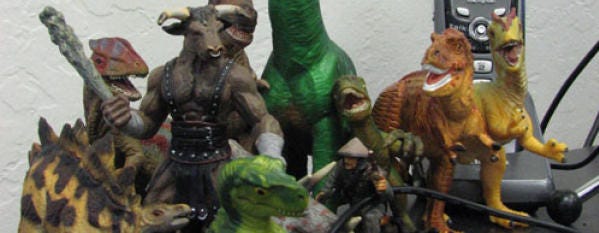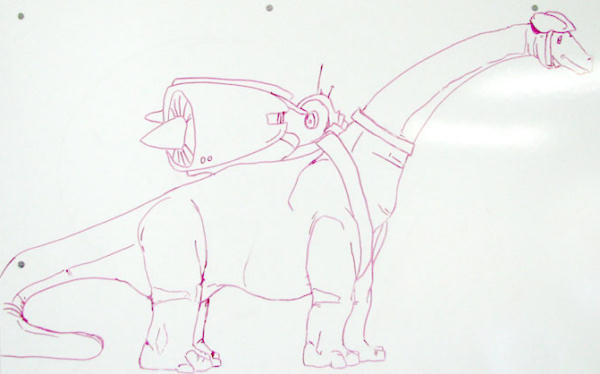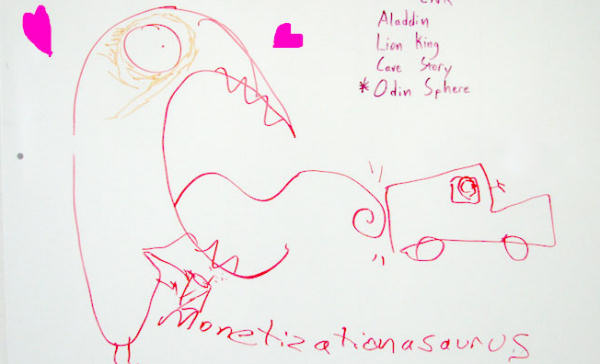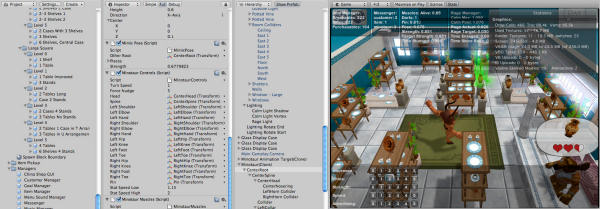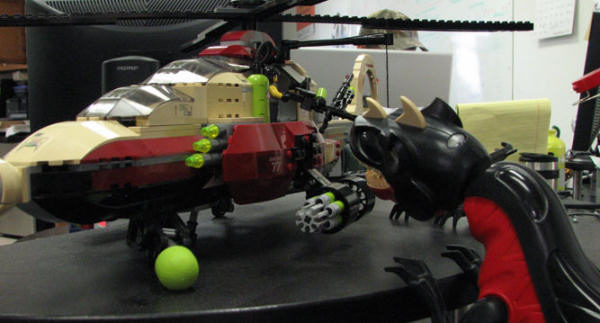Minotaur China Shop Is Live, We Talk To Flashbang
Flashbang's latest opus, Minotaur China Shop is now online, and available to play for free via the Blurst site. Go form opinions. To mark the occasion, we grabbed Flashbang's Steve Swink to ask a few questions about the new game, find out which comes first: the name or the game, get shown fascinating prototypes of projects, and see some fantastic behind-the-scenes glimpses into the workings of their "home for abused developers".
RPS: Can you explain for us exactly what Minotaur China Shop is? From the clips we've seen, we're seeing something halfway between a Diner Dash game and the Hulk. On fire.
Steve Swink: Ha ha, that's pretty accurate. We actually started out making casual games years and years ago (look up "Beesly's Buzzwords" for our first shipped title). Our CEO, Matthew, can still rattle off every Diner Dash game, who made them, their characters, plots, and relative sales numbers. The casual market seemed like a good way to build the company's foundation. The reality was that it crushed our souls.
With Minotaur China Shop the only element your description is missing is "strategic entrepreneurial upgrading". As the game evolved from "weird gummy minotaur ragdoll thing smashing stuff" to "actual designed gameplay" we began adding in elements like moves, upgrades, and combo systems. The end result is sort of a blend of Diner Dash, Hedgehog Launch, and Hulk: Ultimate Destruction. On fire, of course. The game is an experiment in giving the player constraints and opportunity to maximize profit within those constraints.
RPS: Which comes first - the name for the game, or the idea behind it? It's really tempting to believe that someone said, "Jetpack Brontosaurus", and someone else said, "Okay!"
SS: That's very nearly how it went down! Jetpack Brontosaurus came from a single whiteboard sketch by our art director, Ben Ruiz. He was doodling one day on one of our ubiquitous wall-mounted whiteboards. What started as a humble Brontosaurus quickly grew to include turbines and safety helmet. It hung there for weeks as we finished up Raptor Safari, jet-setting its way into our collective hearts and subconscious. When the question was asked "so, chaps, what next?" all eyes turned immediately to Messeurs Jetpack and Brontosaurus upon the wall. It was a toss-up between Jetpack Brontosaurus and Stegosaurus Swiftboat. No contest.
The whiteboard sketch still exists, actually, just above the Monetizationosaurus left by Kyle Gabler of 2dBoy.
As for Minotaur China Shop, it's an extension of the technology that powered Jetpack Brontosaurus. Which is to say, it began as a physics test. The apatosaurus in Jetpack Brontosaurus is actually a ragdoll throughout the game, even when he looks animated. His physical joints constantly update their target rotations to match keyframed animations. This lets us keep things physically fresh while still controlling style. Our tech artist, Adam Mechtley, spent a few days extending this "powered ragdoll" style technology to a biped. He wanted to see if we could get a physically-active ragdoll up and walking around. When he needed a model and test environment, "Minotaur" and "China Shop" seemed the natural conclusion. The first prototype of the game was all Adam in a few days of work. The early versions were very clumsy, so we leaned into accidentally breaking things as part of the gameplay. It took off from there. Here is that very first prototype. Arrow keys to move.
RPS: How is the free model working out for you as a team? Velociraptor Safari has been played a *lot* - have you figured out a way to turn that into money?
SS: Oh, it's brilliant! Here's how it works:
1) Make a new game every 8 weeks that amuses and entertains us, buoying our tired workaday souls.
2) Release it free on Blurst for people to play, enjoy, participate in, and offer feedback on.
3) ???
4) Profit $!
Humorously, that's only a mild simplification. What we've done for 2008, alongside three iPhone games and three Blurst games, is save up money. The stuff you don't hear about are some not-so-very-fun contract projects we did in order to "make money", a fantastic concept we once read about in a Guy Kawasaki book. We have saved enough, at our current burnrate--6 employee salaries plus office rent, utilities, insurance etc--to spend all of 2009 making awesome games for Blurst. During that time, our goal is to drive traffic to Blurst. Once we hit a certain traffic threshold, we're going to look at ways to make the whole thing sustainable. One idea is to offer subscriptions: users subscribe for six months or a year and get access to additional game features, community extras, special developer forums (for suggesting games and participating in beta tests and so on), unreleased prototypes, and competitions. Something like that. The whole apparatus is web-based so we can be "nimble" and "respond to changing markets." Basically, we're a blue-ocean, web 2.0, game 3.0 kind of company with huge upside and exponential growth potential. Or just a bunch of guys sitting around making cool games about dinosaurs and minotaurs. Your pick!
All of this is possible only because everyone at Flashbang gets paid the same (relatively low) salary, founders and fresh hires alike. We're like a commune in that respect. A home for abused developers. Many of our guys left higher-paying jobs in the retail industry because they like fun things and dinosaurs. Also, they enjoy not having their mortal souls ground into a fine, pasty powder by the grim meathook realities of game production for THQ, Activision, and the like.
RPS: Can you explain why you use Unity, and what benefits it has over other options?
SS: There are essentially two facets to Unity. There's the player-facing stuff, which is basically a game engine that offers full shader support, NVIDIA PhysX, and piles of features. They have all of the stuff that players like and provide different ways of getting content to them (standalone Mac/Windows builds, lightweight browser plugin, iPhone/Wii support, etc). We use the web player to be able to wrap a website and community features around our stuff, and because it makes it easier to assume people are online. Achievements and leaderboards make more sense in a web browser.
The other side of Unity is the developer-facing stuff. It provides a fantastic editing environment with a silky-smooth workflow, a well-designed API, and fast scripting languages. When we develop our games we basically play them nonstop in the editor.
As you can see in the screenshot, the game itself is running alongside all of our developer interfaces. We can pause the game, inspect values on all of our objects, move things around, re-import PSDs and Maya files, recompile scripts, and then unpause. The iteration times are amazing, which means we can try out ideas while we're creating stuff, rather than doing hours of work with no idea how it'll feel in the game itself.
The Unity editor is currently Mac-only, which could spur an entire conversation in itself, but they're going Windows with the 2.5 editor release. We think this is going to be a big deal, because creating games in Unity is a fantastic experience. We love it.
RPS: What's next? And are you up for three-name game suggestions?
SS: We have a few ideas floating around in the tasty Flashbang mindbroth at present. We're always up for suggestions, though! If something makes everyone in the office chuckle after hearing it three times, by law we must create it. Also, keep an eye on Blurst.com; we're VERY likely to have a game name competition at some point that culminates in us actually making a community suggested game. That's right, kids, it's your fifth grade math paper fantasies come to life.
Other possibilities to ponder:
Raptoregon Trail: Instead of settlers, you play as raptors. Instead of bears, squirrels, and bison for food there are raptors. You hit them with an off-road jeep. The game is identical to Oregon Trail in every other respect.
TIME DONKEY: This one is pretty self-explanatory.
Ragdinolympics: Also self explanatory.
Or maybe just "portmanteau master."
By the way, the photo at the top, and the one just above here, are from Flashbang's offices. Click on them, and all the images above, for fullsize versions. And play Minotaur China Shop here.
